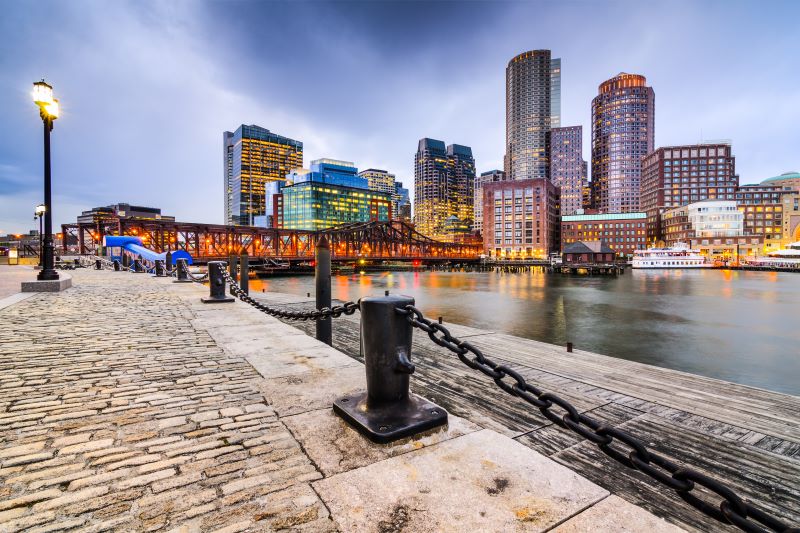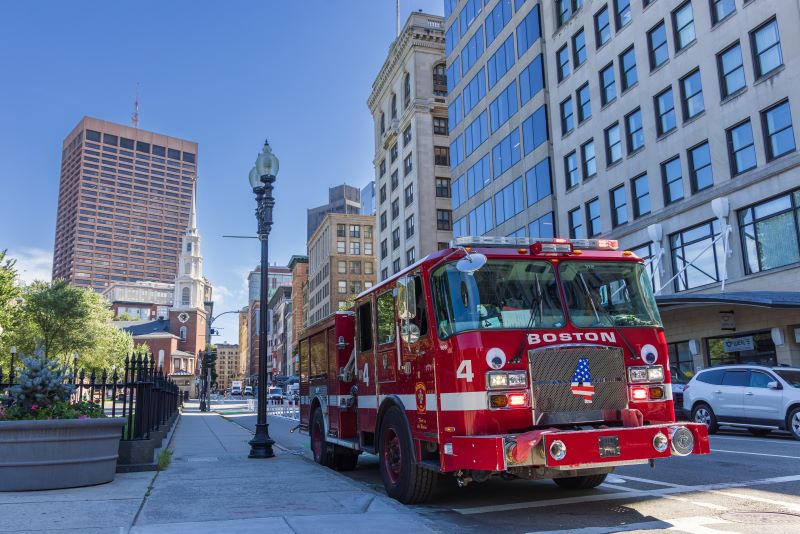
In less than a decade, Airbnb has grown its home-sharing platform to more than 65,000 cities and 191 countries. Other platforms, like HomeAway and VRBO, have created additional competition in the short-term rental marketplace.
On one hand, short-term rentals can be highly lucrative. For instance, a landlord in the Greater Boston area who collects $2,100 per month in rent may be able to charge $210 per night on Airbnb instead. In this scenario, an apartment would only need to be rented for 10 days per month to break even. Any rentals above and beyond that would be additional income in the landlord’s pocket.
On the other hand, renting – or allowing your units to be rented – on Airbnb can cause blowback. Some property owners have expressed concerns over short-term renters creating security issues, crowding on-site amenities like the BBQ area or pool, and disrupting the peace and quiet of residents in neighboring units. For these reasons, multifamily owners have generally been slow to embrace Airbnb. Many have been vocal critics of the site, and others have even sued Airbnb to stop their tenants from renting out units on the platform.
Attitudes towards Airbnb are beginning to change, particularly as laws regarding short-term rentals are clarified. We asked Demetrios Salpoglou, Boston’s largest apartment leasing mogul, his opinion about these home-sharing platforms and he said suggested, “Airbnb is here to stay, and brings value in many locations throughout Boston.”
Indeed, many of Boston’s multifamily owners have realized… if you can’t beat ‘em, join ‘em!
Several have hopped on board with Airbnb’s “Friendly Buildings” program that launched back in September 2016. In short, landlords who agree to let their tenants rent out their apartments on Airbnb will get a cut of the profits (anywhere between 5-15% of what the tenant earns each stay). An estimated 10,000 units were registered through the program in its first year alone.
Generally speaking, there are three ways an apartment owner can participate in the short-term rental industry:
Participate directly by offering one or more furnished units for rent on Airbnb. We’ve seen some investors pay a premium for a well-located property that they intend to then rent solely on Airbnb. Alternatively, existing building owners may opt to convert traditional apartments into short-term rentals as a way of generating higher returns.
Allow a business or individual investor to lease an apartment (at a premium) for the sole purpose of renting that unit on Airbnb. In scenarios like these, the renter has no intention on living in the unit. This setup is rare, but not unheard of.
Allow residents to list their units on Airbnb for occasional use. This is for the weekend-warrior Airbnb host, or for those who tend to travel a lot. Basically, in this scenario, you sign a lease with someone who intends to use the property as their primary residence, but every now and then, that person sub-lets to someone else on Airbnb.
Each of these options comes with its own set of considerations. We’ve laid out some of those considerations below.
First, is it legal?
Massachusetts has no statewide policy regarding short-term rentals through websites like Airbnb. In fact, the Commonwealth is the only New England state that does not allow Airbnb to collect and remit occupancy taxes on behalf of its users. Instead, hosts are expected to comply with local laws, which can vary drastically from city to city. As illustration, we researched three Greater Boston cities – Boston, Cambridge and Somerville – to assess how their short-term rental ordinances differ.
Boston: The City of Boston does not currently regulate short-term rentals. Anyone who runs a business in the city is expected to apply for and obtain a business certificate every four years, but most Airbnb hosts do not consider themselves an independent business and therefore, do not register as such with the city. Some residents have urged the Boston City Council to adopt a short-term rental policy, but no action has been taken in that regard to date.
Cambridge: In August of last year, the City of Cambridge passed an ordinance that restricts short-term rentals to units in owner-occupied buildings. A host can rent his or her home and one other unit in the same building, provided that structure has fewer than five units. Hosts are also required to pass a city inspection to ensure the rentals are safe.
Somerville: At least one Alderman in Somerville has proposed an ordinance that would prohibit the short-term rental of an entire unit (e.g., hosts could only list individual bedrooms—not entire apartments), and hosts must live in the same building. Homes that are used exclusively as Airbnbs would be taxed and inspected as though they were hotels. The proposal is still under consideration. It is not clean when, if at all, the ordinance would be approved and go into law.
Second, will insurance protect you?
Let’s assume your municipality allows short-term rentals without restriction. Now you need to determine whether your insurance policy will cover you in the event of damage or injury caused while renting on a short-term basis. Conventional homeowner’s insurance, for instance, does not typically cover you when something goes wrong with a paying guest.
Before renting a unit on Airbnb, you may need to add coverage or buy an entirely different policy – like business insurance – to ensure you’re fully protected. And be careful about renting to anyone with pets. If your policy does not allow long-term renters to have pets, it probably will not cover short-term renters with pets either. If a guest’s dog bites someone and that animal wasn’t listed on your insurance policy, that damage could far outweigh any potential earnings generated through Airbnb.
What are the fees and costs?
Home-sharing sites usually charge a service fee on each booking, but there are other costs to consider too. For instance, the ordinance proposed in Somerville would require Airbnb hosts to register as a business (which carries a fee) and remit a hotel tax to the city. If you rent out your place for more than 14 days per year, the IRS will expect a cut of your profits, too.
“The first year, I accepted guests for two one-week stays, plus 10 days over Christmas,” explains one Airbnb host. “I ended up paying hefty taxes and investing a lot of time in trying to figure out my tax deductions and finances. Now, I just stick to the 14-day limit.” Be sure to keep flawless records of rental periods and document all business expenses if you plan to rent out any of your units on a short-term basis.
Will you rely on third-party service providers for help?
A whole cottage industry of companies has cropped up to support landlords with bookings, cleanings, key services and other tasks associated with short-term rentals.
What impact will it have on other residents?
Even if it’s legal and more profitable to rent your traditional apartments on Airbnb, you also have to consider the impact short-term guests will have on your other tenants. If people are coming and going at all hours of the night, having wild parties, or otherwise disobeying community rules, your long-term residents will get frustrated. This could lead to tenant turnover and vacancies – costs that quickly add up for landlords.
An alternative approach is to market your property as Airbnb-friendly from the outset. That’s the approach some developers have taken.
For example, Niido Powered by Airbnb apartments are intended to create a win-win for landlords and tenants alike. Residents sign traditional leases and are then allowed to sublet their units on Airbnb for up to 180 days per year in exchange for 25% of the profits. It’s similar to Airbnb’s Friendly Buildings program, except Niido apartments are specifically designed for renting on Airbnb. Features include the Niido app that is easily integrated with Airbnb to include calendar management, amenity bookings, and keyless entry. Similar to a hotel, all Niido properties have a “Master Host” who serves as a concierge for travelers, and buildings have communal spaces like you’d find in a traditional hotel.
By branding properties in this manner, it prevents any consternation among residents who are annoyed by short-term guests. Landlords can also use it as a marketing tool. Travel a lot? Live with us and earn income from your space!
Conclusion
When it comes to short-term rentals, there’s no consensus among multifamily landlords just yet. Rich Haughey, vice president of industry technology initiatives for the National Multifamily Housing Council explains that landlords’ “initial reaction was negative” but “the discussion has evolved.” We suspect the discussion will continue to evolve over time, particularly as laws are clarified and more sophisticated multifamily developers enter the short-term market.
Either way, landlords are encouraged to do their due diligence. As we’ve highlighted here, listing your units on Airbnb is more complicated than you may have realized—with several considerations to take along the way.
Demetrios Salpoglou
Published January 16, 2018
Demetrios has pulled together the largest apartment leasing team in the Greater Boston Area and is responsible for procuring more apartment rentals than anyone in New England – with over 130k people finding their housing through his services. Demetrios is an avid real estate developer, peak performance trainer, educator, guest lecturer and motivational speaker.





